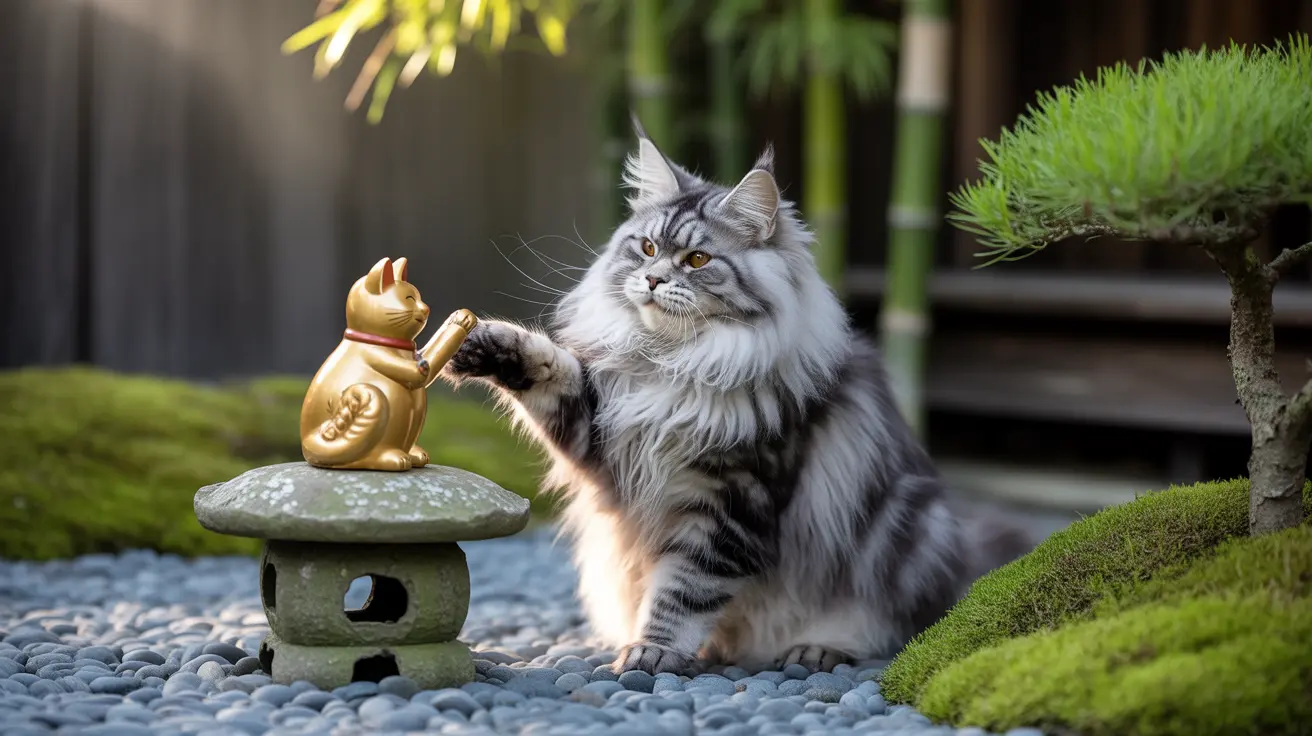For centuries, cats have held a captivating and multifaceted role in Japanese mythology and culture. These enigmatic creatures have transcended their roles as simple companions to become powerful symbols of luck, protection, and supernatural transformation in Japanese folklore and daily life.
From the mysterious shape-shifting bakeneko to the beloved Maneki-neko (beckoning cat), Japanese mythology has woven an intricate tapestry of feline lore that continues to influence modern culture. This exploration delves into the fascinating world of cats in Japanese mythology and their enduring impact on society.
The Historical Journey of Cats in Japan
Cats first arrived in Japan during the 6th century, brought from China primarily to protect Buddhist temple scrolls from rodents. These early feline immigrants quickly captured the imagination of Japanese society, from imperial courts to humble farming communities.
Initially valued for their practical roles in protecting rice stores and silkworm farms, cats soon became associated with mysterious powers and supernatural abilities. Their nocturnal nature, independent spirit, and seemingly magical abilities to see in the dark contributed to their mystical reputation.
Supernatural Cats in Japanese Folklore
The Mysterious Bakeneko and Nekomata
In Japanese mythology, cats were believed to develop supernatural powers as they aged. The bakeneko (transformed cat) could shape-shift, speak human languages, and even perform acts of necromancy. More formidable still was the nekomata, a two-tailed cat demon that emerged when cats lived beyond their natural lifespan.
These supernatural felines were both feared and respected, serving as cautionary tales about the consequences of mistreating animals while also highlighting the mysterious nature of cats themselves.
The Lucky Maneki-neko: Japan's Beckoning Cat
Perhaps the most recognizable feline symbol in Japanese culture is the Maneki-neko, the beckoning cat statue found in businesses and homes throughout Japan and worldwide. These cheerful figures, with their raised paws and welcoming expressions, are believed to bring good fortune and prosperity to their owners.
Each aspect of the Maneki-neko carries specific meaning: the raised left paw attracts customers, while the right paw draws wealth. The cat's colors also hold significance, with white representing purity, gold symbolizing prosperity, and black offering protection from evil spirits.
Cats as Spiritual Guardians
In Japanese mythology, cats are often portrayed as protective spirits and guardians of sacred spaces. Their presence in temples and shrines is believed to ward off evil spirits and bring good fortune. This spiritual connection is further emphasized in stories where cats serve as messengers between the mortal and spiritual realms.
Modern Influence and Cultural Impact
Today, the influence of cats in Japanese mythology extends far beyond traditional folklore. Cat cafés, cat islands like Tashirojima, and popular culture phenomena like Hello Kitty demonstrate the ongoing cultural significance of felines in modern Japan.
The integration of these mythological elements into contemporary life shows how deeply embedded cats are in Japanese cultural identity, bridging ancient beliefs with modern expressions of appreciation for these beloved animals.
Frequently Asked Questions
What is the significance of cats in Japanese mythology and folklore?
Cats in Japanese mythology are viewed as mystical beings with supernatural powers, serving as both protectors and potential shape-shifters. They're considered bearers of good fortune and spiritual guardians, with strong connections to both the physical and spiritual worlds.
How did the Maneki-neko become a symbol of luck and prosperity in Japan?
The Maneki-neko's origins trace back to various legends, including one about a cat that saved a nobleman from lightning at Gotoku-ji Temple. These stories, combined with cats' historical role in protecting valuable assets, led to the Maneki-neko becoming a widely recognized symbol of good fortune.
What are the differences between Bakeneko and Nekomata in Japanese legends?
Bakeneko are cats that have developed supernatural powers through age, capable of shape-shifting and human speech. Nekomata are more powerful entities that emerge when cats live exceptionally long lives, characterized by split tails and more malevolent abilities.
How do the colors and raised paws of Maneki-neko figurines affect their meanings?
The left paw raised attracts customers and people, while the right paw beckons wealth. Colors carry specific meanings: white for purity and happiness, gold for wealth, black for protection against evil, and other colors for various specific blessings.
Why are cats considered spiritual guardians and symbols of transformation in Japanese culture?
Cats' natural abilities, including night vision and silent movement, led to their association with the supernatural realm. Their role in protecting valuable assets and their perceived ability to move between physical and spiritual worlds established them as powerful spiritual guardians and symbols of transformation.






